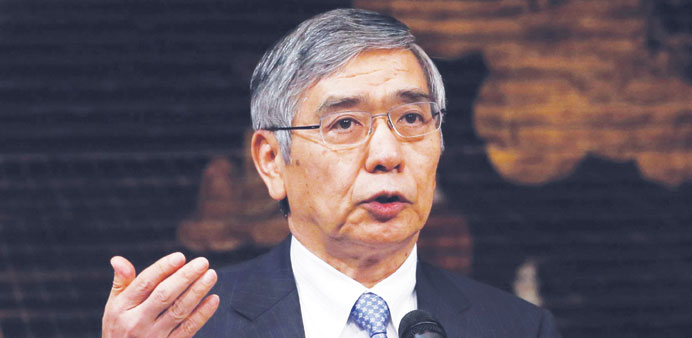|
|
- Japan’s core consumer inflation held firm in August at the fastest rate in nearly five years, a Reuters poll showed, suggesting steady progress towards ending 15 years of nagging deflation.
Much of the gains in August are likely to come from high energy prices, which could cause some concern about the negative impact on households.
However, officials from the Bank of Japan have expressed confidence that prices will continue to rise and approach its 2% inflation goal due to a tight labour market and signs that companies are starting to raise wages.
Japan’s core consumer prices, which includes oil products but excludes prices of fresh food, rose 0.7% in August from a year earlier, according to a Reuters poll of 28 economists.
That would match the rise in the year to July, which was the fastest in almost five years. The Internal Affairs Ministry will release consumer price data on September 27.
“Gasoline prices have been rising due to gains in crude oil prices,” said Hidenobu Tokuda, senior economist at Mizuho Research Institute.
“There’s also a pass through of higher prices on food due to a weaker yen.”
BoJ Governor Haruhiko Kuroda emphasised that the central bank would not simply focus only on the inflation goal, but wanted to entrench expectations of sustained and ongoing price rises.
“Japan seeing 2% inflation just temporarily isn’t enough. That level needs to be sustained stably. That means long-term inflation expectations, not just underlying consumer inflation, must reach 2%,” he told a seminar yesterday.
The BoJ launched an intense burst of monetary stimulus in April, pledging to double the base money through aggressive asset purchases to achieve its 2% inflation target in roughly two years.
Core consumer prices in Tokyo, available a month before the nationwide data, are forecast to have risen 0.3% in September from a year earlier, slightly slower than a 0.4% annual rise in August.
Japan emerged from recession in 2012 and data for much of this year has shown the benefits of Prime Minister Shinzo Abe’s reflationary policies and the BoJ’s aggressive monetary stimulus.
The economy grew for a third straight quarter in April-June, comfortably outstripping many of its G7 counterparts, as businesses and consumers have started to increase spending on the back of a promising outlook.
Meanwhile, Japan’s economic recovery is expected to survive the impact from scheduled increases in the sales tax, a Reuters poll showed, as the government prepares economic stimulus measures to soften the blow.
Prime Minister Shinzo Abe is set on October 1 to sign off on an increase in the 5% sales tax to 8% in April and then to 10% in October 2015 to pay for welfare costs.
The world’s third-largest economy is forecast to grow 2.8% in the fiscal year to March 2014, a Reuters poll of 24 economists showed. The survey, conducted September 12-19, was little changed from the August poll.
Growth is expected to slow to 0.7% in the following fiscal year as the first increase in the sales tax will slow consumer spending. That forecast also was little changed from last month’s poll.
In fiscal 2015, growth will then accelerate to 1.5%, higher than 1.1 growth forecast last month, as declines in consumption will be temporary.
“Growth in Q1 next year should be boosted by spending being brought forward ahead of the consumption tax hike, which should slow growth in the second quarter,” said Marcel Thieliant, economist at Capital Economics.
Japan is considering $50bn in economic stimulus to cushion the blow of the national sales-tax increase, which is meant to rein in the government’s massive debt, people involved in the decisions have told Reuters.
The tax hike is the biggest effort in years by a Japanese government to contain a public debt that, at more than twice the nation’s annual economic output, is the biggest in the world.
The economy grew an annualised 3.8% in the second quarter, driven in large part by strong consumer spending, boosting the case for Abe to go ahead with the sales tax hike.
Critics of the plan have called for a delay or watering down of the tax increase on the view Japan’s economy is still too weak to take the pain. Many politicians blame the last sales-tax hike, in 1997, for plunging the country into recession.
The poll also showed that Japan’s core consumer prices were expected to rise 0.8% for the fiscal year starting April 2014 and 0.8% for fiscal 2015, excluding the effect of the expected sales tax hike.
In comparison, the Bank of Japan’s latest forecasts are for a 1.3% rise and a 1.9% increase, respectively.
The BoJ overhauled monetary policy in April in a bold move to pull Japan out of 15 years of mild deflation.
The central bank’s target is around 2% inflation in about two years, but the gap between forecasts in the Reuters poll and the BoJ’s forecasts shows that economists doubt this target can be met.
Under the BoJ’s new policy framework, which it introduced in April, the central bank plans to expand the monetary base by ¥60tn to ¥70tn per year.
The BoJ pledged to buy ¥50tn in government bonds per year, purchase ¥1tn of ETFs and 30bn yen in real-estate investment trusts per year.

